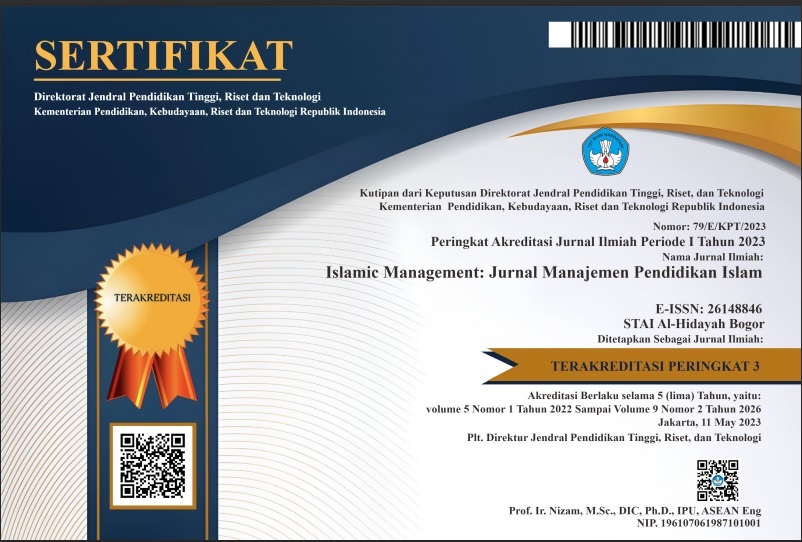MANAJEMEN STRATEGIK DALAM PENGEMBANGAN PENDIDIKAN ISLAM DI PONDOK PESANTREN SYEKH BURHANUDDIN KUNTU KECAMATAN KAMPAR KIRI
DOI:
https://doi.org/10.30868/im.v3i2.741Abstract
This study aims to determine the application of strategic management at the stage of environmental observation and analysis, strategy formulation, strategy implementation and evaluation as well as control in the development of education in the Islamic boarding school of Sheikh Burhanuddin Kuntu, Kampar Kiri District, Kampar Regency. This research is field research with a qualitative research approach—data collection techniques: observation, interview and documentation. The research informants consisted of the leaders of the Islamic Boarding School, Head of Madrasah Tsanawiyah (al-Wustha), Head of Madrasah Aliyah (al-Ulya), Deputy Head of Madrasah Aliyah (al-Ulya) Curriculum, Student Affairs, Facilities and Infrastructure and Public Relations. Data analysis techniques: deductive, inductive and comparative. The results of his research are strategic management in the development of Islamic education at the stage of environmental observation and analysis in the Islamic Boarding School of Sheikh Burhanuddin Kuntu, Kampar Kiri District, Kampar Regency, including: observation and analysis of the external environment (geographical, religious, social, cultural and economic), and observation and internal environmental analysis (Human Resources / leadership, managers, teachers and staff), students / students, sources of funds, facilities and infrastructure), Then2 the application of strategic management in the development of Islamic education at the stage of strategy formulation at Syekh Burhanuddin Kuntu Islamic Boarding School, including: formulate and determine the vision, mission and objectives, and formulate and determine the strategy, direction and policy, furthermore the application of strategic management in the development of Islamic education at the implementation stage of the strategy at Syekh Burhanuddin Kuntu Islamic Boarding School, including: implementing an education system, curriculum, schedule of learning activities, culture learning, learning methods, and finally the application of strategic management in the development of Islamic education at the evaluation and control stages (control strategy) at the Islamic Boarding School of Shaykh Burhanuddin Kuntu, including: applying regulations, etiquette and ethics of students / students, implementing regulations, etiquette and ustadz ethics / teacher, conduct communication and coordination meetings (briefings), prepare monthly reports, and prepare annual reports.
References
Ahmad Junaidi Djamarin, Wawancara, Kuntu Kecamatan Kampar Kiri Kabupaten Kampar, 2019. Sumber Data, Dokumentasi, Pondok Pesantren Syekh Burhanuddin Kuntu Kecamatan Kampar Kiri Kabupaten Kampar, 2019.
David, F. R. (2003). Strategic Management: Cases: Pearson College Division.
Dhofier, Z. (1982). Tradisi pesantren: Studi tentang pandangan hidup kyai: Lembaga Penelitian, Pendidikan, dan Penerangan Ekonomi dan Sosial.
Fattah, N. (2019). Landasan manajemen pendidikan.
Fuad, C. Y. (2004). Menjadi Kepala Sekolah Profesional, Dalam Kontek Menyukseskan MBS dan KBK: Bandung: Remaja Rosdakarya.
Hidup, T. P. R. (1996). KH Imam Zarkasyi: Dari Gontor Merintis Pesantren Modern: Ponorogo: Gontor Press.
Islam, L. S., Kemasyarakatan, & Indonesia). (1995). Sejarah pendidikan Islam di Indonesia: lintasan sejarah pertumbuhan dan perkembangan: RajaGrafindo Persada.
Karabel, J., & Halsey, A. H. (1977). Power and ideology in education: Oxford University Press.
Langgulung, H. Manusia dan Pendidikan; Suatu Analisa Psikologi dan Pendidikan,(Jakarta: Pustaka al-Husna, 1995). Cet. III.
Mas’ud, A. (2002). Sejarah dan Budaya Pesantren, dalam Ismail SM, et. al. Dinamika Pesantren dan Madrasah, Yogyakarta: IAIN Walisongo Semarang dan Pustaka Pelajar.
Morris, W. (1969). American heritage dictionary of the English language: American heritage.
Muhaimin, M. (2011). Pemikiran dan aktualisasi pengembangan pendidikan Islam: Rajawali Press.
Muhammad, S., & Ilahi, W. (2006). Manajemen Dakwah: Prenada Media.
Munib, A. dkk. 2012. Pengantar Ilmu Pendidikan.
Nurcholish, M. (1997). Bilik-Bilik Pesantren Sebuah Potret Perjalanan. Jakarta: Paramadina.
Robbins, S. P., & dan Coulter, P. Mary. 1999. Manajemen. Terjemah T. Hermaya. Edisi Keenam Jilid.
Rofi, S. (2016). Sejarah Pendidikan Islam di Indonesia: Deepublish.
Steenbrink, K. A. (1974). Pesantren, madrasah, sekolah: recente ontwikkelingen in Indonesisch Islamonderricht. Meppel [Netherlands]: Krips Repro.
Sugiono, S. (2013). Metode Penelitian Kualitatif. Bandung: Alfabeta.
Wheelen, T. L., & Hunger, J. D. (2010). Strategic management and business policy: Achieving sustainability: Pearson/Prentice Hall.
Downloads
Published
How to Cite
Issue
Section
Citation Check
License
Authors who publish with this journal agree to the following terms:
- Authors retain copyright and grant the journal right of first publication with the work simultaneously licensed under a Creative Commons Attribution License that allows others to share the work with an acknowledgment of the work's authorship and initial publication in this journal.
- Authors are able to enter into separate, additional contractual arrangements for the non-exclusive distribution of the journal's published version of the work (e.g., post it to an institutional repository or publish it in a book), with an acknowledgment of its initial publication in this journal.
- Authors are permitted and encouraged to post their work online (e.g., in institutional repositories or on their website) prior to and during the submission process, as it can lead to productive exchanges, as well as earlier and greater citation of published work (See The Effect of Open Access).






